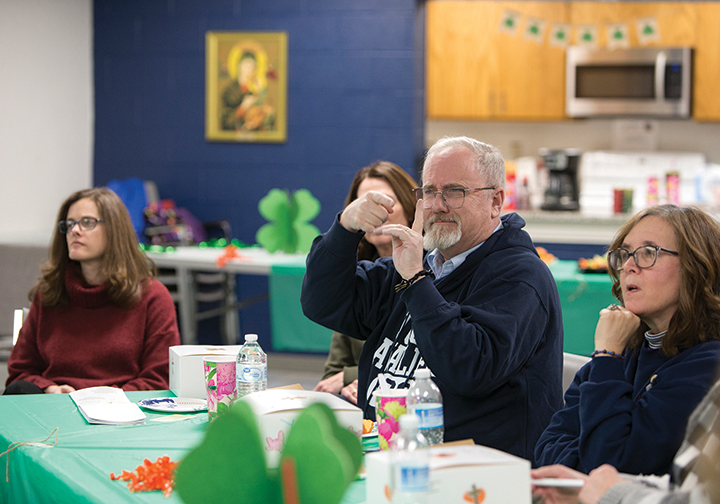
by Moira Cullings
moira.cullings@theleaven.org
TOPEKA — “Deafness is a hidden thing,” said Minette Sternke.
“You might see someone’s cochlear implant or hearing aid,” she said, “but we don’t have walkers, wheelchairs or anything like that to identify us as ‘deaf.’
“If we are not seen, then we cannot be recognized, and it can be difficult to be integrated into the workings and life of the parish or diocese.”
To combat the challenges deaf individuals face within the church, Sternke led a daylong deaf retreat on March 11 at Most Pure Heart of Mary Church in Topeka.
The theme of the retreat was: “God’s Beloved,” based on Father Henri Nouwen’s book “Life of the Beloved.”
“The main thing I was trying to get across [was]: You are unique, special and made by God for a purpose to be a blessing upon the world,” said Sternke.
“There will be challenges,” she continued, “but if we embrace them, we can then use our experiences to give back to the world.”
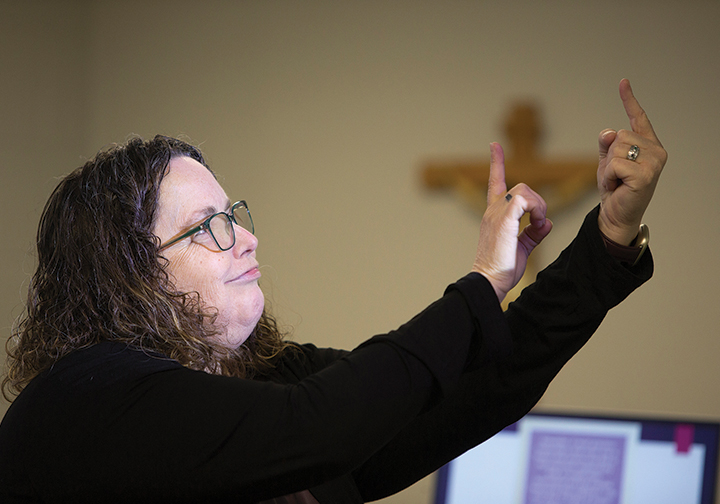
Sternke grew up Catholic in a small town near Hannibal, Missouri. She was hard of hearing until she lost her hearing completely at age 14.
She currently works as vice president of the National Catholic Office for the Deaf (NCOD) and is the only consecrated virgin in the country who is deaf.
“I always feel at home in any Catholic church,” said Sternke, “but that is not often true [for others] in the deaf community.
“My desire is to help the deaf feel more at home in the Catholic Church so they can experience the God that made them, sanctified them and loves them more fully.”
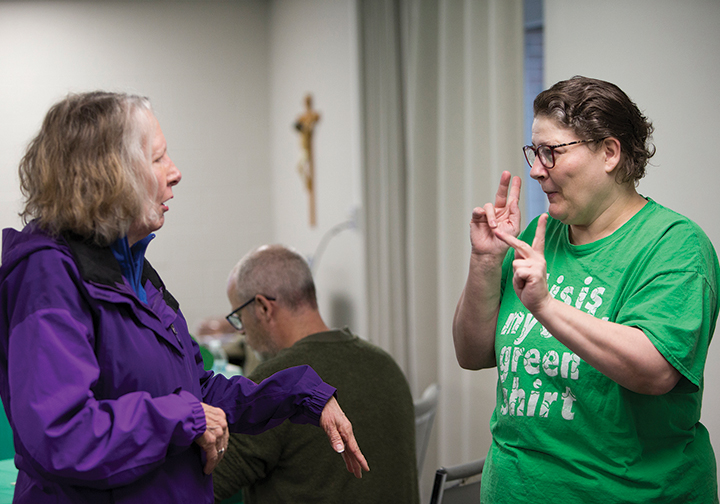
Sternke conveyed that message during the retreat through her talk and various activities.
Attendees also had the opportunity to go to confession and participate in a deaf Mass celebrated by Father Scott Wallisch, chaplain to the deaf.
According to Katie Locus, consultant for archdiocesan deaf ministry, the archdiocese hosts a retreat for the deaf community twice a year at Most Pure Heart of Mary and St. Paul Church in Olathe.
Most deaf community members in the archdiocese live in either Olathe or Topeka, she said, with the rest scattered in other towns, making those two locations easily accessible for most.
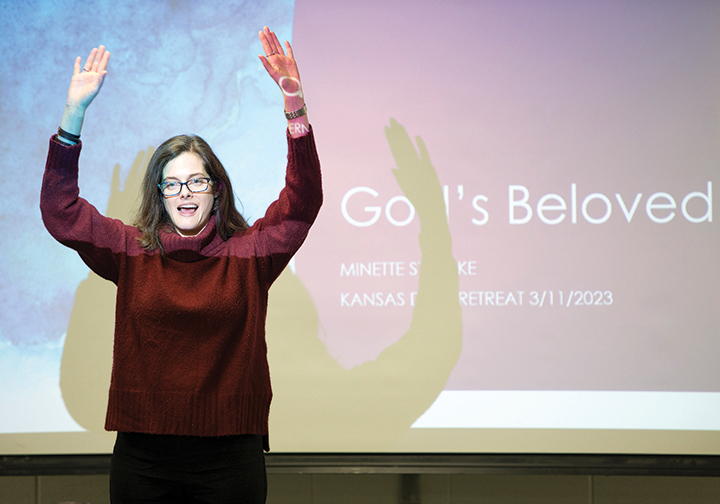
Aaron and Jeannine Adkins were eager to attend the most recent retreat. Parishioners at Most Pure Heart of Mary for more than 27 years, the couple has 10 children, eight here on earth, and all are hearing.
Jeannine has been attending deaf retreats since she was 15 years old, and Aaron since he was 21.
“Retreats are a time for us to recharge physically and mentally,” said Jeannine.
“Retreats give us the opportunity to be able to witness and hear what’s going on in our hearts,” said Aaron.
The couple explained how important retreats in American Sign Language (ASL) are for those who are deaf.
“ASL is a visual language based on a naturally evolved system of signs, movements of the body and facial expressions,” said Jeannine. “Many churches are still learning to understand deaf people and their culture.”
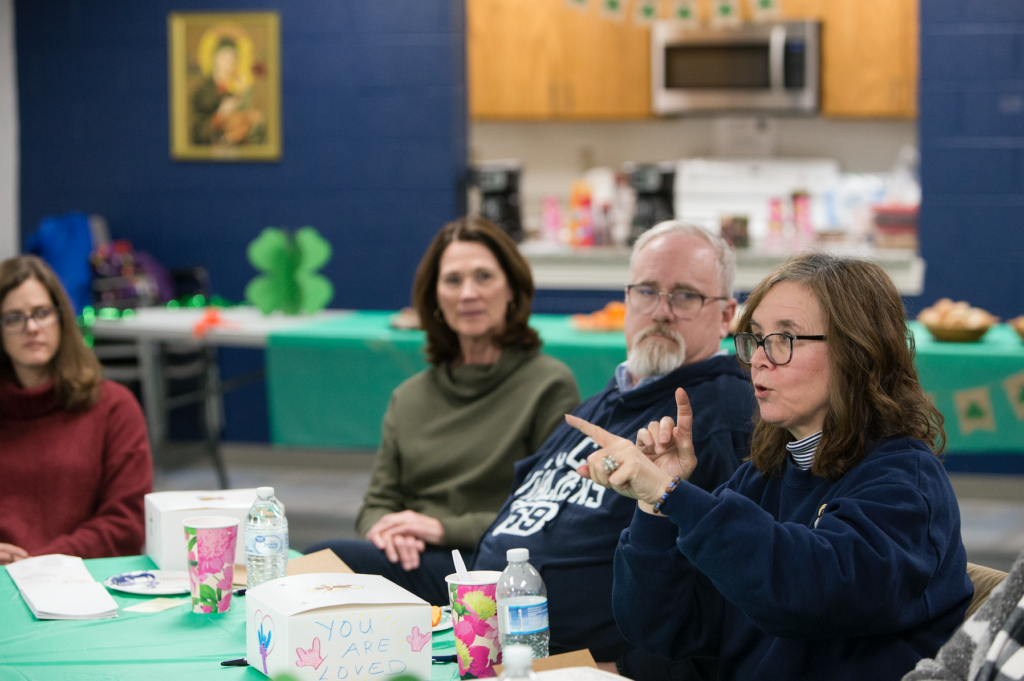
The couple believes more deaf leadership is needed within the church.
“Hearing people have access to so many resources to help their spiritual growth,” said Jeannine, “where deaf people do not have the same.
“Many deaf people prefer to worship in ASL. Hearing people can be catalysts and supporters in making this happen, as we need both deaf and hearing people working together to reach deaf people.”
One aspect of Sternke’s presentation, in particular, served as a poignant reminder for attendees that their struggles can produce blessings.
Sternke played a video about “kintsugi,” the Japanese art of repairing broken pottery with gold.
“It just struck me that God uses our own brokenness in a similar way that the Japanese would use the broken pieces of pottery,” said Locus.
“There have been so many instances of saints that would say that if we really knew the positive impact our difficulties would have on our journey to heaven, we would all be scrambling to enter more difficulties.
“That concept of ‘kintsugi’ brought that home to me.”

It’s a concept with which many in the deaf community can relate.
“The deaf community is often marginalized and unintentionally ignored,” said Locus. “So they don’t often know very much about what we believe or why we believe it — or even whether they can actually participate in church.”
It’s critical, she said, that the deaf have opportunities to learn more about the faith and how they can contribute to the church.
“Otherwise, they will just fade out of the faith and out of our church,” said Locus. “Because who else will invite them to learn about the faith and to be involved?
“Who else will notice them?”






